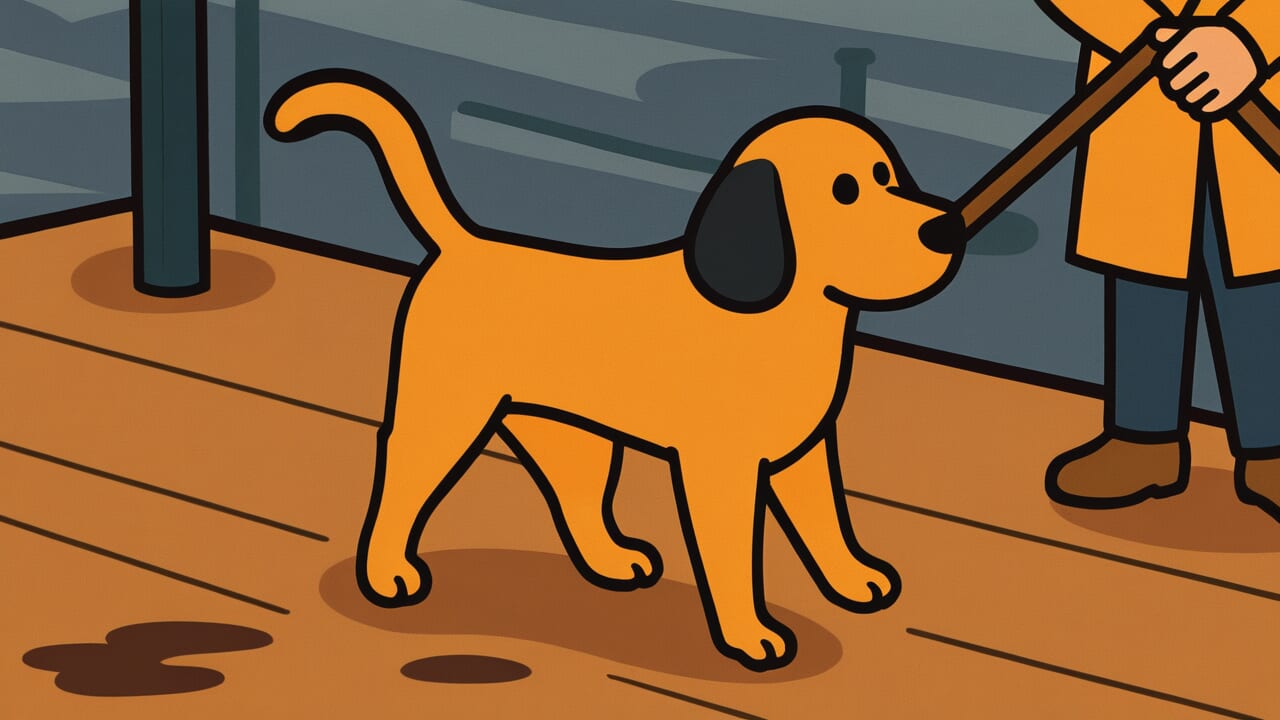How to Read “A dog that goes under the stick won’t be hit”
Tsue no shita ni mawaru inu wa utarenu
Meaning of “A dog that goes under the stick won’t be hit”
This proverb means that if you act obediently toward those with power or authority, you won’t suffer harm.
Like a dog that quickly moves into the space right under someone raising a stick, you can protect yourself by not opposing powerful people.
Instead, you move closer and show a willingness to follow them.
People use this saying when talking about how those in weaker positions should build relationships with stronger ones in organizations or society.
It describes a survival strategy of securing safety through obedience rather than resistance or confrontation.
Even today, people understand this approach in workplace hierarchies and relationships with power imbalances.
However, this proverb doesn’t just recommend being obedient. It contains practical wisdom about acting smartly to avoid unnecessary conflicts.
Origin and Etymology
The exact first written appearance of this proverb is unclear. However, based on its structure, people likely used it during the Edo period.
The expression depicts a dog quickly moving under someone who has raised a stick.
The stick has long held important meaning in Japanese culture as a symbol of power and authority.
A stick carried by a samurai or household head wasn’t just a walking aid. It also demonstrated authority.
Meanwhile, dogs were seen as animals kept by humans who understood master-servant relationships and showed obedience.
This proverb likely emerged from the strict class system and hierarchical relationships of feudal society.
The social structure of that time is reflected here: opposing the powerful brings punishment, but acting obediently helps you avoid harm.
A dog moving under a stick demonstrates instinctive wisdom for avoiding danger.
If you enter the attacker’s space before being attacked, they can’t swing the stick down.
The cleverness of this proverb lies in applying this skillful survival tactic to human social life.
Usage Examples
- The new boss is strict, but “a dog that goes under the stick won’t be hit,” so I’ll just follow along obediently
- The people who’ve survived at that company must be practicing “a dog that goes under the stick won’t be hit”
Universal Wisdom
This proverb has been passed down because it deals with the universal theme of power relationships in human society.
In every era and every place, people divide into those with power and those without. Everyone must live within these relationships.
Humans have self-respect and naturally don’t like being subordinate to others.
But at the same time, we have an instinct to survive. People have always struggled between these two conflicting desires.
Should you protect your pride and resist? Or should you bow your head to protect yourself?
This choice has been a constant human challenge from ancient times to today.
This proverb offers practical wisdom for survival. Ideally, all people should be equal.
But in real society, differences in power clearly exist.
Within that reality, avoiding pointless conflicts and protecting yourself while living isn’t something to be ashamed of. This recognition is embedded in the proverb.
Humans are social animals who can only live in groups. Groups inevitably create hierarchies.
How you behave within that hierarchy affects your individual fate.
Our ancestors faced this unavoidable reality directly and extracted wisdom for survival from it. That wisdom is condensed in this proverb.
When AI Hears This
When you view a dog slipping under a stick as an information game, a surprising strategy emerges.
Normal submission means “surrender after being attacked,” a reactive response.
But this dog uses “move outside attack range the moment you detect attack possibility,” a proactive response.
In other words, it doesn’t even give the opponent a chance to decide whether to attack.
In game theory, attackers weigh “attack cost” against “attack benefit.”
Swinging a stick down requires physical effort, and it’s wasted if it misses.
By entering the blind spot directly under the stick, the dog takes “a position where swinging down won’t hit.”
Then the expected value of attacking becomes negative, and a rational attacker won’t choose to attack.
What’s interesting is that this strategy exploits “information asymmetry” in reverse.
The dog doesn’t fully know the opponent’s attack intention.
But from just the visual information “holding a stick,” it judges that attack possibility isn’t zero and preemptively moves to a safe zone.
This is an optimal response under incomplete information.
It’s a rational choice that factors in asymmetry: the cost of false detection (wasted effort fleeing) is far smaller than the cost of missing it (pain of being hit).
Lessons for Today
This proverb teaches us modern people the importance of reading situations.
You don’t need to fight in every situation. Sometimes you need the flexibility to step back and enter the other person’s space.
Modern society especially requires us to live while interacting with people in various positions.
Bosses, business partners, local communities, government agencies—many counterparts exist where power relationships are present.
If you oppose all of them, you’ll exhaust yourself.
What matters is balancing obedience with being yourself.
This proverb doesn’t recommend blind submission. Rather, it teaches the wisdom of acting smartly to conserve energy for truly important moments when you can use your full strength.
If you’re facing an unreasonable situation right now, remember that confronting it head-on isn’t the only solution.
Sometimes there’s a path forward where you respond flexibly, maintain relationships, and move toward your goals.
That’s not weakness. It’s the strength to survive a long life.



Comments